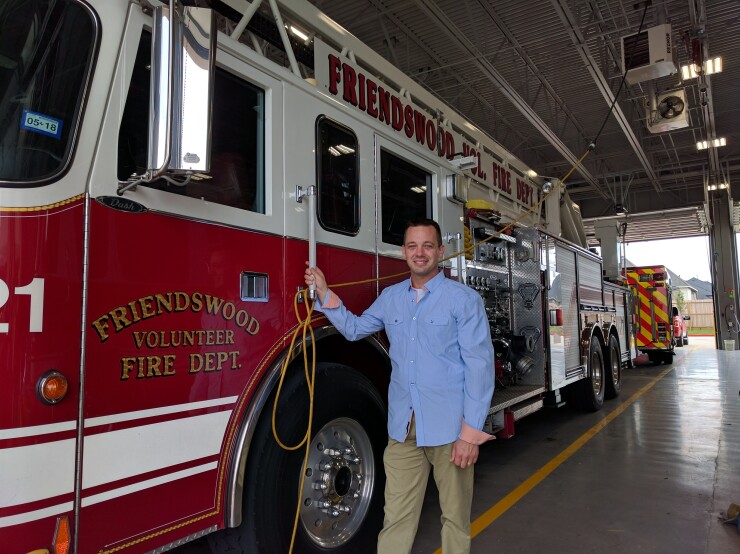FRIENDSWOOD, Texas — Even before he opened his mouth to answer the question, Brent Cockerham’s bleary eyes revealed just how little sleep he got during Hurricane Harvey.
He was awake all night on Saturday, Aug. 26, as well as the following night. Two hours of sleep on Monday. Zero again on Tuesday. “It becomes a blur after that,” he said.
Cockerham, a 41-year-old commercial banker at the $972 million-asset Moody National Bank, serves as a volunteer firefighter in Friendswood, one of the cities hit hardest by the storm’s massive floods.
During the hurricane, he spent night after sleepless night coordinating rescue missions and ferrying stranded residents to safety, part of a ragtag, heroic team that saved countless lives all over southeast Texas.
On Sunday he sat inside the city’s fire station and humbly recounted his role in the perilous rescue efforts. “We do what we were trained to do,” Cockerham said, referring to the local firefighters who led the response.

At least two Friendswood residents died amid the record-setting rainfall, which transformed the city’s streets into rivers. One of the victims was
“Many people have put their lives in danger to help others,” Friendswood Mayor Kevin Holland said
'A heavy weight'
Cockerham was still in high school in Durham, N.C., when he giddily signed up as an emergency responder for the first time. “I couldn’t believe that they would even let 16-year-olds join the fire department,” he recalled.
In the two and a half decades since, Cockerham has gone to college, done a stint in the Marines, enrolled in business school, gotten married, started a family and launched a 12-year career in banking. At Moody, which is based in nearby Galveston, he is an executive vice president and commercial banking manager.
In his day job, Cockerham helps people achieve financial security for their families, which brings a certain type of satisfaction. But it is not the same as saving lives.
So when Cockerham moved to this city of almost 40,000 residents, he joined the volunteer fire department.
Friendswood, which is a short drive from NASA’s mission control center in Houston, has been hit hard by severe weather before. During
When the storm arrived, Friendswood owned just four boats that could be used for rescues — far short of what was needed to evacuate an estimated 1,000-plus residents from flooded homes.
As the water rose rapidly, private boat owners started arriving and plucking stranded residents from their homes — an inspiring scene of courageous volunteerism that was replayed in numerous Houston-area neighborhoods.
There were airboats, bass boats and canoes — perhaps 30 or 40 boats in all — many of them piloted by folks from other communities. “Anything that would float and carry an extra person or two was sent in,” Cockerham said.
Even dump trucks got pulled into the rescue. Cockerham recalled with admiration how dump-truck drivers agreed to drive into five feet of water, and to keep going even as the water splashed over their windshields.
“They said: ‘Roger that. I’ll be right back,' ” he recounted.
As Harvey stalled over the Houston area, dumping roughly 50 inches of rain, Cockerham was among the rescue workers who pulled people out of their homes to safety. He recalled that some of the residents were so shaken that they needed to be told calmly where to put each foot and hand as they stepped onto ladders.
But a lot of Cockerham’s time was spent in the city’s emergency operations center, where his job was to coordinate the chaotic rescue efforts. His years of experience on the front lines of emergencies made him more valuable now behind the scenes.
So he spoke with colleagues over the radio, while also furiously sending text messages to volunteers, forwarding the addresses of homes whose residents had called 911.
Looking back at how it all unfolded, Cockerham said that he would have preferred to be pulling families from their homes than sending others into danger.
“There’s a heavy weight that gets carried,” he said. “Because you know that there are calls for help that you’re not getting to. You know that you’re putting your guys in harm’s way.”
“But that’s the job that I was asked to do,” he added.

'For some of them, it’s therapeutic'
Cockerham’s own house was largely spared in the flooding. Some carpet had to be torn out of a single room, a fact that he shared with a tinge of embarrassment, since many of his neighbors fared far worse.
He expressed gratitude that his colleagues at Moody National Bank covered for him last week. Fifteen of the bank’s 16 branches were open by last Wednesday.
“The fact that our team at the bank was able to come together,“ he said, “it allowed people like me to not be able to come in, and that’s huge.”
Victor Pierson, Moody’s chairman and CEO, said that roughly 10% of the bank’s employees reported that their homes suffered a substantial amount of physical damage.
“Even if they lost their home, they made every effort to get to the bank,” he said. “For some of them, it’s therapeutic, to get away from what they’re dealing with and get back to some sense of normal.”
For his own part, Cockerham plans to be back at work on Tuesday, though he’s still trying to regain his bearings following so many sleepless nights.
“Until somebody said, ‘We’ve got church tomorrow,’ I didn’t know what day it was,” he said with a laugh.





